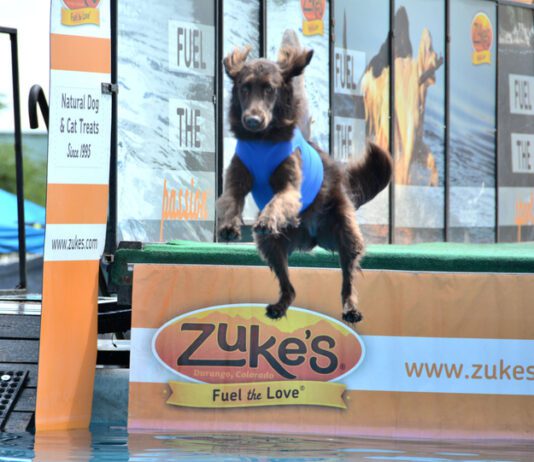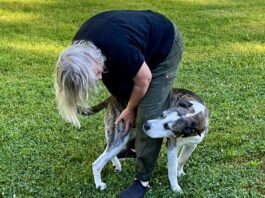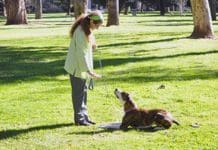Thinking about the “Sit! Sit! SIT!” Syndrome
There is a behavior that the vast majority of humans reliably demonstrate when meeting an unfamiliar dog or puppy: they will tell the dog to "Sit! Sit! SIT!" Even in the face of any evidence whatsoever that the dog understands the word, people will repeat it again and again, and say it louder and more emphatically, seemingly certain that the dog was too distracted or just didn't hear them. It never seems to cross their minds that the dog doesn't fully understand what the word means.
It is a testament to our love for and comfort with dogs, I guess, that we so often assume they understand our language. But why do we so often expect a strange dog - or as an even better example, a young, untrained puppy - to understand "Sit!" I find it so aggravating!
Why do I even care? For two reasons:
It is a testament to our love for and comfort with dogs, I guess, that we so often assume they understand our language. But why do we so often expect a strange dog - or as an even better example, a young, untrained puppy - to understand "Sit!" I find it so aggravating!
Why do I even care? For two reasons:
How do we Westerners hate foxtails*? Let us count the ways…
Here in California, it's foxtail time. This grassy weed is everywhere outdoors - in the wilderness areas where we hike, yes, of course, but also alongside suburban sidewalks and coming up in cracks in city parking lots. They are in my backyard and front yard and side yards. I spend hours each week pulling them up by the roots and carefully discarding them in the green waste bin, because there is a tiny seed at the base of every single strand on every waving frond on every plant that will grow another foxtail plant next year. If you have a very small yard, with enough years of dedicated weeding, you can eliminate them from your yard. I have a large yard and I will never see the end of them.
Why are they a problem? They are so pretty! You can run the fronds through your fingers and they are so soft - as long as you stroke them from bottom to top. If you try to reverse the direction of your caress, you learn instantly why they are the most reviled weed in the west.
Why are they a problem? They are so pretty! You can run the fronds through your fingers and they are so soft - as long as you stroke them from bottom to top. If you try to reverse the direction of your caress, you learn instantly why they are the most reviled weed in the west.
I’d Like Some Veterinary Medicine, Please
After having a medical issue of my own recently, I had an epiphany: I'd rather see a veterinarian than deal with the human medical system.The usual routine with human medicine: If something serious happens suddenly, you have to go to the emergency room; your own doctor can't see you right away for anything serious.The ER patches you up enough to be released and tells you to follow up with your own doctor. At the day of the appointment, your doctor decides you need an x-ray or ultrasound or other test - and sends you to another clinic or testing laboratory where this is done. It takes days for the results to get back to your doctor, and when he gets them, he sends you elsewhere for treatment. At least, that's what happened to me, recently.
More Foster Stories with Good Outcomes
Here's another post to provide closure to some of the foster-dog stories I've shared with you in recent months.
In mid-March, I wrote about being fairly depressed by the arrival of two foster dogs. I had pulled the first one from my local shelter as a prospect for a friend of my son, who was looking for an athletic, medium-sized dog. I had never seen the dog outside of a kennel, first at my local shelter, and then, after we evacuated the shelter during the Oroville (Calif.) Dam scare, at a friend's house (she took in about 20 of the shelter's dogs!). He had a darling face, seemed quiet in the kennel, and looked like a Poodle-something-mix. As soon as it was safe for me to go back home after the evacuation, I asked to foster him.
It wasn't until I got him home that I saw he wasn't going to work for my son's friend. That young man is a professional athlete, and was looking for a dog he could take out for runs; this dog could barely stand up! He had as little muscle tissue as I've ever seen on a dog, and he stood and walked way back on his wrists." It seemed clear he had been kept in a crate or tiny pen for most of his life. He also had a bad habit of barking LOUDLY when he wanted something or when he was frustrated. This
In mid-March, I wrote about being fairly depressed by the arrival of two foster dogs. I had pulled the first one from my local shelter as a prospect for a friend of my son, who was looking for an athletic, medium-sized dog. I had never seen the dog outside of a kennel, first at my local shelter, and then, after we evacuated the shelter during the Oroville (Calif.) Dam scare, at a friend's house (she took in about 20 of the shelter's dogs!). He had a darling face, seemed quiet in the kennel, and looked like a Poodle-something-mix. As soon as it was safe for me to go back home after the evacuation, I asked to foster him.
It wasn't until I got him home that I saw he wasn't going to work for my son's friend. That young man is a professional athlete, and was looking for a dog he could take out for runs; this dog could barely stand up! He had as little muscle tissue as I've ever seen on a dog, and he stood and walked way back on his wrists." It seemed clear he had been kept in a crate or tiny pen for most of his life. He also had a bad habit of barking LOUDLY when he wanted something or when he was frustrated. This
A Change of Venue: An Update on Rosie
Way back in November I wrote about finding a great prospect for my sister-in-law Leslie and my seven-year-old niece, Ava. In my local shelter, after looking for months, I found a darling young Shepherd-mix who impressed me as having superior self-control for being such a young dog, as well as infinite sweetness and affection for people. On the other hand, she was a younger dog than I had originally considered for them, and who seemed to have the potential for being larger than I had originally hoped. But she was just SO SWEET and fun and smart; she loved engaging with people, loved kids, loved to cuddle, and learned things fast. I discussed her with Leslie, and then brought her home for to evaluate her further. (Because I foster so much for my shelter, I get special privileges when it comes to taking dogs for a trial. Plus, I have a nearly perfect success rate at finding homes for my foster dogs.)Every day I had the dog, I liked her more. She loved playing with my young dog Woody, was able to finesse the grumpy response she got from my older dog, Otto, and met all my other friends and their dogs in a happy, friendly way. Leslie and Ava came to meet her, and really hit it off. Ava named her Rosie, and I committed to keeping and training her for a few more weeks while Leslie would work to find a dog-walker who could help them for a few months, so they could get through Rosie's puppyhood and go on to a happy life together. It all seemed like it was going to work out perfectly.
Why Are These Dogs Not Getting Adopted?
In the May issue of WDJ, you will see a couple photos of a black and white dog. He is a ward at my local shelter, the Northwest SPCA in Oroville, California. He has been at the shelter since being dropped off there in a cardboard box, found by the employee who opened the shelter that day, shortly before Christmas. He and his two siblings were estimated to be about 8 weeks old at that time. They are now about six months old. When the shelter was evacuated in February, this dog, his sister, and about 12 other dogs were taken in by my friend Sarah Richardson, owner of the boarding/training/daycare called The Canine Connection in nearby Chico, California. She boarded them free of charge for about 10 days, and recruited clients and friends to come over and take the dogs out for walks and potty breaks and play sessions. I was evacuated also, and spent a few days there helping with the dogs. Even though I had seen the dogs at the shelter before the evacuation, this was the first time I had actually put my hands on them.
Oh, Woody
I recently went on a vacation without dogs, for a whole week. My sister took care of my perfect, nine-year-old dog Otto, but my young adult son took care of my adolescent dog, Woody. It was a better fit because my son is an athlete and runs, and Woody would get enough exercise to keep him out of trouble.About 36 hours after I returned and met with my son and brought Woody home, I awoke to the sound of a dog about to vomit you all know that sound. I jumped out of bed and ran to open the door and encourage the vomiter, who of course turned out to be Woody, to go outside. He lurched over to some tall grass and threw up. Then he went back into the house, climbed onto the couch, and went back to sleep. I went back to bed.I was way too tired to investigate the vomitus until after it was light out, later that morning. Here is what I found!
Don’t Let Them Get Obese!
More and more often, it seems, I see a super fat dog surrendered to the shelter. I always feel sorrier for these dogs than for the thin ones, because we can get a skeletal dog looking pretty healthy in a month's time, but in the shelter environment, an obese dog may not be able to lose an ounce! Caged in a small run, being over-fed...the conditions are likely to make them even fatter! Plus, few people want the panting, exercise-intolerant, unattractive dogs; they end up lingering in our adoption kennels for a long time. And few of them have ever experienced anything like what must feel, in comparison to their former soft lives, like total deprivation - hard time - in the shelter environment.
One dog I've talked about before was this darling Labrador, who was surrendered to my local shelter weighing 110 pounds. By California law, she needed to be spayed before she could be adopted, but the surgery couldn't be scheduled before she lost at least 20 or more pounds; surgery on such an obese dog takes a long time - the fat just floods into the incision and obscures the tissues that need to be cut and sutured - and is considered high risk.
One dog I've talked about before was this darling Labrador, who was surrendered to my local shelter weighing 110 pounds. By California law, she needed to be spayed before she could be adopted, but the surgery couldn't be scheduled before she lost at least 20 or more pounds; surgery on such an obese dog takes a long time - the fat just floods into the incision and obscures the tissues that need to be cut and sutured - and is considered high risk.
My Dog’s Springtime Allergies: RIGHT on Time
In past years, I've discussed my system of keeping a yearly calendar for my dogs that is loaded with notes about their health and behavior. It helped me identify the earliest signs of Otto's springtime allergies, and take proactive management steps to minimize his suffering.
Dog Training Wisdom from Pat Miller
I've worked with Woody a LOT on reducing his reactivity to the sight of strange dogs and people, and he's come a long, long way. If he spots someone (dogs or people or both) that he regards as "strange," he will usually emit a small growl; that's my cue to pay attention and manage the situation BEFORE it's a situation. In the beginning, I would just counter-condition like mad from a safe and sane distance (doing a quick U-turn and exuberant trot off into the opposite direction if need be), and then delivering treats to him in a rapid-fire fashion. The goal is to change how Woody FEELS about seeing strange dogs or people by making it RAIN treats whenever he sees said strange people or dogs; a secondary goal is to get him to look to me when he sees something alarming, so I can give him direction and reassurance that all is well.In the early days of our counter-conditioning sessions, I wasn't looking for any particular behavior from Woody; the point of counter-conditioning is not to (immediately) change the dog's behavior, but to change his emotional response from a negative one to a positive one. Once he's been conditioned to feel happy about the sight of "strange" people or dogs, as evidenced by a quick look at his handler with what Pat calls the "Where's my treat?!" look, changing his behavioral response becomes easy and not so highly charged. In recent months, Woody has improved to the point where I can give the cue "Off!" and he will instantly and happily look away from whatever it is that has him spooked and look at me for the treats.
Why These Dogs are Making Me Sad
For the past three days, anyone who has called me has asked, "What's wrong?" I keep thinking I'm doing a fine job of covering my irritation and emotional upset, and answering the phone the way I always do, but apparently - not.For weeks, since the evacuation of my shelter, I've been fostering a young dog who was brought into the shelter a few days before the evacuation. The people who brought him to the shelter said they found him as a stray. It later developed that someone who saw him in the shelter recognized him as the dog who belonged to the people who surrendered him; they pretended he wasn't their dog when they surrendered him. That happens often enough that no one at the shelter was surprised to learn this. The dog is adorable, but he's got problems - physical and behavioral.I think he's been kept in a crate or small pen his whole life; he has the least amount of muscle tone of any dog I've ever met.
Titer Tests, and Preventing Overvaccination
Every year since I adopted Otto from my local shelter, I have sent out his blood to a lab for a "vaccine titer test." The test I ask for detects circulating antibodies that defend against two canine diseases: distemper and parvovirus. Veterinary immunologists feel that the results of this particular test offers a reliable indication of whether the dog is adequately protected against the diseases he has been vaccinated for, or whether he no longer has a detectible number of antibodies to those diseases in his body.


















